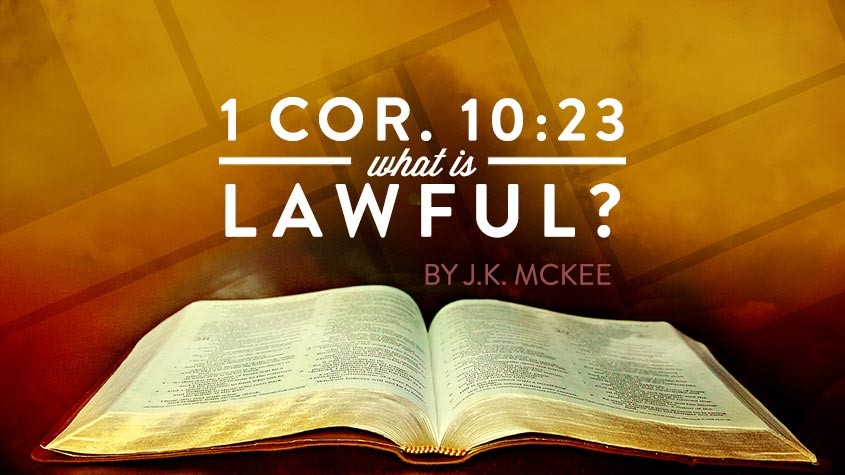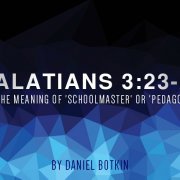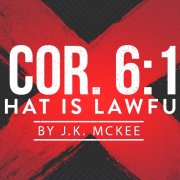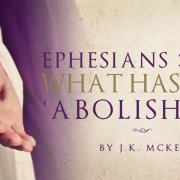1 Corinthians 10:23 – What is Lawful?
How can you say that the Law of Moses is still to be followed by Christians today, when it is quite clear that all things are now lawful?
Pastor: 1 Corinthians 10:23: All things are lawful so we can edify the body.
“All things are lawful, but not all things are profitable. All things are lawful, but not all things edify.”
The statement, “All things are lawful so we can edify the body” is an extreme stretch of what 1 Corinthians 10:23 communicates. This verse repeats the slogan “Everything is permissible” (NIV) or Panta exestin, which Paul has refuted earlier in 1 Corinthians 6:11, chastising various Corinthians for thinking that they could get away with certain sinful activities, which he has said is something not at all profitable or useful. Later on in the letter of 1 Corinthians, more has to be communicated, and it surely behooves a responsible Bible reader to view 1 Corinthians 10:23 in light of the wider cotext of 1 Corinthians 10.
In 1 Corinthians 10:1-11 Paul issues an important reminder to the Corinthians, specifically how what occurred to the Ancient Israelites in the past, took place as examples for Messiah followers to consider, with the expressed reason “so that we would not crave evil things as they also craved” (1 Corinthians 10:6). Paul is clear to direct his audience, “Now these things happened to them as an example, and they were written for our instruction, upon whom the ends of the ages have come” (1 Corinthians 10:11). Given the fact that much of what the Torah says is to be understood as a “warning” (RSV), so that previous mistakes committed by God’s people, like fornication and idolatry, are not subsequently repeated (1 Corinthians 10:7-9)—the Apostle Paul by no means should be considered as someone opposing the Law of Moses here. A major focus of his admonishment to the Corinthians is precisely so they can resist lawlessness, and in particular the idolatry present in their local community:
“No temptation has overtaken you but such as is common to man; and God is faithful, who will not allow you to be tempted beyond what you are able, but with the temptation will provide the way of escape also, so that you will be able to endure it. Therefore, my beloved, flee from idolatry” (1 Corinthians 10:13-14).
The Apostle Paul is very concerned about what various Corinthians have been participating in, referencing how at the Lord’s Supper multiple people partake of the wine and bread (1 Corinthians 10:16-17), and multiple people also participate in the animal sacrifices of the Temple in Jerusalem (1 Corinthians 10:18). While these are persons who participate in useful, edifying exercises intending to honor God in some way, what of those who participate in sacrifices made to idols? While an idol may be made of gold, silver, stone, or wood—there is a definite spiritual presence that sits behind an idol—and those who participate in its veneration associate themselves with Satanic demons:
“What do I mean then? That a thing sacrificed to idols is anything, or that an idol is anything? No, but I say that the things which the Gentiles sacrifice, they sacrifice to demons and not to God; and I do not want you to become sharers in demons. You cannot drink the cup of the Lord and the cup of demons; you cannot partake of the table of the Lord and the table of demons” (1 Corinthians 10:18-21).
While the Apostolic decree of Acts 15:19-21 forbade the new, non-Jewish Believers from participating in idolatrous activities, the Apostle Paul has told the Corinthians why it is unacceptable. He has referenced the infamous scene of the golden calf (1 Corinthians 10:7; cf. Exodus 32:4), and also the Numbers 25 encounter of the Moabite prostitutes brought in by Balaam and consequent slaughter of the offenders (1 Corinthians 10:8). The blight upon much of Greco- Roman paganism was worship of idols associated with gross sexual immorality. While some of the Corinthian “Believers” were most unfortunately involving themselves in these activities, others had probably just looked at them from a distance, perhaps feeling a pull from various family members and friends who did not recognize Yeshua.
The thrust of the Apostolic decree was that the new, non-Jewish Believers did not have to have the Torah’s Instruction forced upon them; it was, rather, to make sure that they could fellowship with their fellow Jewish Believers and be steadily instructed at the local synagogue from the Torah—starting with what the four prohibitions meant (idolatry, fornication, things strangled, blood). Yet as Acts 18 testifies, the Messiah followers were driven out of the Corinthian synagogue. This could certainly have affected the thinking of many, and the lure of one’s previous lifestyle in paganism was still present. The slogan Panta exestin or “We are free to do anything” (NEB) once again has to be responded to by Paul (NIV):
“Everything is permissible” —but not everything is beneficial.
“Everything is permissible” —but not everything is constructive.
While Paul has just upheld the authority of Israel’s Scriptures for the instruction of born again Believers—referencing examples of idolatry and sexual immorality—he still has to refute what various Corinthians have been saying. The statement, of 1 Corinthians 10:23a, is practically identical to what was asserted earlier in 1 Corinthians 6:12a, with Paul’s response being all’ ou panta sumpherei, “but not all things are helpful” (RSV). Repeating the slogan in 1 Corinthians 10:23b, Paul responds to “Everything is permissible” (NIV) with, ou panta oikodomei, “but not all things edify” (NASU). In this second response, the verb oikodomeō[1] is employed, which not only should immediately key us into Yeshua’s mission to come and restore Israel (Matthew 16:18; cf. Jeremiah 33:7, LXX), but as Thiselton indicates, “building up presupposes the logical grammar of building the community.”[2] The Corinthians have been saying “Everything is permissible” (NIV), but it is quite obvious that not all things are at all edifying or “constructive” (NIV) for the Body of Messiah and its mission in the Earth.
Again, we have to be reminded that when people think that they are free do to whatever they want (as these Corinthians were), challenging such views frequently has to be done on logical grounds and not just Scriptural grounds. Paul does not agree that “Everything is permissible” (1 Corinthians 10:23, NIV), because most frequently what people think that they can get away with will be to the detriment of Body of Messiah. Paul is quick to assert, “Let no one seek his own good, but that of his neighbor” (1 Corinthians 10:24), a definite application of the Torah’s requirement to love neighbor. Does the Corinthians’ behavior help the Body of Messiah and its purposes, much less outsiders to the faith who need to see the power of the One God of Israel operating through them? Witherington’s comments are useful to consider here:
“Paul once again reports the Corinthians’ inevitable response to his argument: ‘Everything is permitted’ (v. 23). But not everything is useful or profitable or builds up the body of Christ, and in a deliberative argument it is critical to stress what is beneficial or advantageous. The Christian is one who does not seek his or her own advantage but rather that of others.”[3]
So, with Paul having just asserted that Believers need to be highly concerned with the spiritual edification of others, what follows in 1 Corinthians 10:24-33 is a potential application of this for the Corinthians themselves. This section is admittedly difficult for many of today’s Messianics, who believe in the continued validity of the kosher dietary laws, to understand (in fact, those who are highly or even hyper-sensitive about what they eat, frequently ignore this section of Paul’s letter).
Has the Apostle Paul cast aside the commandments of kashrut and/or the Apostolic decree by writing, “Eat anything that is sold in the meat market without asking questions for conscience’ sake; FOR THE EARTH IS THE LORD’S, AND ALL IT CONTAINS [Psalm 24:1]” (1 Corinthians 10:25-26)? Many readers take this statement as meaning that, at the very least, Paul considers the kosher dietary laws to be a matter of adiaphora, something that really does not matter the way one views it, one way or another. When it comes to eating, a commentator like Fee thinks that “Paul takes a decidedly ‘liberal’ stance on this issue,” arguing that unlike scrupulous Jews who were likely to investigate the origins of everything they would eat, “Paul is telling the Corinthians not to conduct such inquiries. Meat is meat; buy and eat.”[4] The main issue of concern here is how the Apostolic decree forbade the non-Jewish Believers from eating things strangled and blood. Does this now no longer matter? Is Paul “going rogue”?
On the one hand, it could possibly be argued that if in a metropolitan area like Ancient Corinth there were ever significant food shortages—that eating whatever was sold in the meat market (makellon) was preferable to starving.[5] This would fit with the ancient Jewish principle of Pikku’ach Nefesh or regard for human life, where unclean things could be consumed in order to maintain or extend life. On the other hand, though, the argument that the Corinthians were to “buy and eat” whatever they pleased is one which has been eisegeted into the text. The clause Pan to en makellō notably includes the present passive participle pōloumenon,[6] and is better rendered with “Eat everything being sold in a meat market…” (LITV). Would the Corinthian Believers be those who actually purchased the meat?
The flesh of the animals being sold is certainly made by the Creator God (cf. Psalm 24:1), and all creatures are inherently “good” to some degree or another. Likewise, the scene of various festal gatherings at the local shrine or pagan temple is certainly not in view. Bruce is right to conclude, “Even if the meat did come from a sacrificed animal, they are not going to eat it as part of an idolatrous feast or in company where they risk becoming ‘partners with demons’.”[7] Ultimately, while one can participate in idolatrous worship in the company of dark spiritual forces, when one possibly eats meat that has originated from such services in the privacy of another’s home, the supremacy of the One God of Creation must be recognized (1 Corinthians 8). Paul has rightly said, “Therefore concerning the eating of things sacrificed to idols, we know that there is no such thing as an idol in the world, and that there is no God but one” (1 Corinthians 8:4).
The real reason why Paul has just stated to eat whatever is being sold in the meat market is not so that the Corinthian Believers can disregard the Apostolic decree. There are specific conditions which must be in place, specifically as it concerns accepting an invitation to visit a non- Believer’s home and be served a meal: “If one of the unbelievers invites you and you want to go, eat anything that is set before you without asking questions for conscience’ sake” (1 Corinthians 10:27). Fee is correct to assert, “Paul has absolutely forbidden attendance at temple meals,” but the scene here is dining “in a pagan home.”[8] If a non-Believer wants to demonstrate his hospitality to one of the Corinthian Believers—and it might especially be a chance to testify of Yeshua the Messiah—then Paul’s instruction is to go and eat what is served. Such Corinthian non-Believers would have been those who frequented the local meat market,[9] and as Thiselton indicates, “The meat almost certainly will be what had been offered in a temple, especially since the host serves good quality fare.”[10]
The Corinthian Believers, as a matter of respect to the host, are simply not supposed to ask about what they are served. This would pertain to whether the meat was something kosher like beef or lamb, or something unclean like pork. It would also pertain to various meat ingredients possibly used in side dishes. Morris is right to conclude that Paul “discouraged over- scrupulousness.”[11] The likelihood that if a Corinthian Messiah follower goes to the home of a pagan friend, or even family member, and finds out that meat served was presented before idols, then the Apostle Paul is clear that for conscience’s sake he or she was to refuse the meal:
“But if anyone says to you, ‘This is meat sacrificed to idols,’ do not eat it, for the sake of the one who informed you, and for conscience’ sake; I mean not your own conscience, but the other man’s; for why is my freedom judged by another’s conscience? If I partake with thankfulness, why am I slandered concerning that for which I give thanks?” (1 Corinthians 10:28- 30).
Some Believers, in finding out that meat served at someone’s private home had been sacrificed to idols, would realize that the God of Israel is all-powerful, and that willful participation in idolatry is not occurring. Yet at the same time, if Messiah followers discover that they are served meat sacrificed to idols, it is to be refused on account of what it communicates to others, particularly those brothers and sisters who could easily relapse back into paganism. Paul warned earlier in 1 Corinthians 8:10, “For if someone sees you, who have knowledge, dining in an idol’s temple, will not his conscience, if he is weak, be strengthened to eat things sacrificed to idols?” This is not something that Paul wants in the least! Witherington also rightly says, “if one would go ahead and eat, then the host would see that as a violation of one’s own religion. It would be a bad witness to that person.”[12] Here, the errant Corinthian slogan in action, “All things are permitted,” could certainly backfire if a Corinthian Believer continued eating once knowledge of where meat originated was stated. Fellowship with the Corinthian non-Believers had some definite risks.
Paul directs the Corinthians, “Whether, then, you eat or drink or whatever you do, do all to the glory of God” (1 Corinthians 10:31). With doxan Theou in view, there are obviously limits as to how far one can go with fellowshipping or interacting with non-Believers. In many cases, while the invitation to eat at the home of a non-Believer’s table would be good, as one could share the gospel, the chance that it would negatively affect younger and weaker brethren could require it to be turned down. Paul is concerned with the Corinthians not unnecessarily offending anyone (1 Corinthians 10:32), recognizing “I try to please everyone in everything I do, not seeking my own advantage, but that of many, so that they may be saved” (1 Corinthians 10:33, NRSV). But even while a level of self-identification with a potential audience is good (cf. 1 Corinthians 9:19-23), it is obviously something that has to be kept within appropriate boundaries. Everything that one does in terms of seeing people brought to salvation must be done via the rubric of imitating Yeshua. Paul requires, “Be imitators of me, just as I also am of Messiah” (1 Corinthians 11:1).
Because the need to share the good news with a pagan Corinthian family might be too great, some Corinthian Believers may have found it necessary to just eat whatever these people set before them out of their genuine hospitality. Temporarily suspending things like kosher eating, for the needs of the moment, may be necessary. But participating in sins such as idolatry, to the point of eating any kind of meat that was knowingly sacrificed to idols, was to Paul unacceptable. It was a bad witness to non-Believers once a Believer found out the meat originated from the pagan temple.
This conclusion does run contrary to the sentiments of many in today’s Messianic movement (especially those in the self-labeled Torah movement), for whom keeping the kosher dietary laws is sometimes more important than basic morality and love for neighbor. Yet, nowhere does the Apostle Paul allow for the Corinthians to participate in idolatry, which is a capital offense in the Torah. Eating unclean things is not a capital offense, as the Lord only says, “You shall not eat any abomination” (Deuteronomy 14:3, ATS), ultimately placing one’s being “abhorrent” (NJPS) as a personal condition. Eating unclean things set before oneself is considered to be on a different level than committing idolatry and denying the God of Israel. At the very most, would any Corinthians be served unclean things, the worst thing they would really experience could be indigestion.
The Torah does not specify what one eats at the level of high offenses like idolatry, sexual immorality, or murder. And, unless one holds to an impossibly rigid application of Moses’ Teaching, there are life exceptions to the rules of kashrut, as indicated by the conditional invitation of Corinthian Believers being asked to the home of a non-Believer (1 Corinthians 10:28)—an invitation which could have been turned down by many of them. Nowhere in 1 Corinthians 10 does Paul uphold the slogan “All things are permitted,” because he certainly does not allow—once it is discovered—for the Corinthians to eat meat sacrificed to idols. Unfortunately in much of contemporary Christianity, the maxim of “All things are permitted” now includes much, much more than what one might be served at a non-Believer’s dinner table.
Endnotes:
[1] “to construct in a transcendent sense” or “to help improve ability to function in living responsibly and effectively, strengthen, build up, make more able” (BDAG, 696).
[2] Thiselton, 781.
[3] Witherington, 1 & 2 Corinthians, 226.
[4] Fee, 1 Corinthians, 481.
[5] Cf. Thiselton, 783 on “food shortages.”
[6] The verb pōleō (pwle,w) means “to exchange or barter goods, to sell or offer for sale” (LS, 713).
[7] Bruce, 1 and 2 Corinthians, 98.
[8] Fee, 1 Corinthians, 483.
[9] Sampley, in NIB, 10:921 makes the appropriate linguistic connections between 1 Corinthians 10:25, 27, which serves to support that it is the Corinthian non-Believers who purchase that which is being sold at the meat market:
“[T]he same wording used in 10:25 (pa/n…evsqi,ete pan…esthiete, ‘eat everything’—with the ‘everything’ placed first for emphasis—without any problems for your moral consciousness) urges the believer to feel conscience-free to eat whatever is placed before him or her.”
[10] Thiselton, 786.
[11] Morris, 1 Corinthians, 146.
[12] Witherington, 1&2 Corinthians, 227.











Leave a Reply
Want to join the discussion?Feel free to contribute!